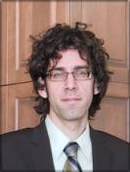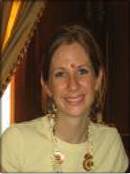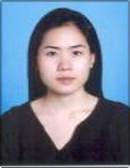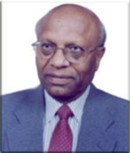 |  | 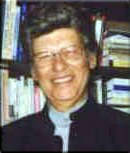 |
The admission process for the summer school 2006 is going on. The following scholars had been already admitted and agreed to attend the school. Their partial information is given below. Information for the admitted scholars shall be updated periodically.
| | Hope K. Fitz is a Professor of Philosophy at Eastern Connecticut State University. She is a comparative philosopher by education, teaching, research/philosophy, and her professional activities. Her PhD is in Asian and Comparative Publications, and her professional activities. However, her teaching and publications are broader in that they involve western and non-western philosophy or as she would prefer to say, “the philosophical traditions of the north, east, south, and west.” Dr. Fitz's book, Intuition: Its Nature and Uses in Human Experience, is in is second printing. She is presently writing the first of four volumes having to do with Ahimsa: a Way of Life. The first volume is entitled Ahimsa: a Path to Peace. It concerns how the teaching and practice of ahimsa can bring peace to the world. The other three volumes will be dedicated to the history and development of ahimsa in the Hindu, Jain and Buddhist traditions. Dr. Fitz has numerous articles published in scholarly journals and anthologies, which include non-western and comparative topics. In addition to her teaching and scholarly work, Dr. Fitz is the Director of the Peace Human Rights Committee at her university. |
 | James M. Hastings teaches Asian History at Wingate University in North Carolina. With a long-standing interest in Indian culture and religions, he began formal study in California in the 1980s and later obtained a Ph.D. in South Asian Religions from the University of Wisconsin-Madison. His research interests have been focused on Rajasthan and the formation of bhakti communities, especially in and around Jaipur State, since the sixteenth century. His work has been primarily on the Dadupanthi community, exploring the social and political influences upon its development and its ties with the Rajput community. He has extending his interest to other religious communities historically tied to Jaipur, including Jain communities. As a professor of South Asian and world civilizations, he intends as a result of this program to incorporate more in-depth discussions of Jainism into his teaching. |
| | Nathan Loewen currently teaches courses in comparative religious ethics with the Faculty of Religious Studies at McGill University, and courses in comparative ethics and religious worldviews with the Department of Humanities at Marianopolis College in Montreal Canada. Mr. Loewen has pursued a research interest in Jaina ethics and philosophy since the beginning of his Ph.D. studies. By means of the summer study program he plans to increase the depth of his teaching about the Jains as a key component in his courses, as well as create an ‘Introduction to Jainism' course in the very near future. Mr. Loewen is completing his Ph.D. at McGill University in the philosophy of religion. His dissertation project reworks the traditional construals of the ‘problem of evil' in order to positively respect the diversity of the world's religions and respond constructively to issues of globalization. |
| | Anne Vallely is Assistant Professor in the Department of Classics and Religious Studies at the University of Ottawa. Her interests fall within the broad field and approach of the Anthropology of Religion. Her work focuses on the Jain religious and cultural tradition in India, as well as on the transnational Jain community outside of India, and has been particularly concerned with ethics, asceticism, sacrifice and religious theory, and women's religious lives. She is also deeply concerned with religion and “nature,” especially in the area of animals in religious thought and practice, and in terms of the symbolic construction of human/non-human boundaries cross-culturally. Recently she has begun to explore the field of death and ‘transcendence' studies as a means of understanding the ways in which knowledge of mortality informs religious and cultural institutions. The Jain ritual fast to death (sallekhana) is of great interest in this regard. Anne Vallely has several publications in the field of Jainism, including the book: Guardians of the Transcendent: An Ethnography of a Jain Acetic Community, University of Toronto Press 200. |
| | Pankaj Jain is pursuing his PhD in Indian religions and ecology at the University of Iowa. He is also teaching Asian religions in a community college there. He holds an MA in Indian religion from Columbia University, New York. His paper, “Householders and Renouncers in Indic Traditions,” was selected as one of the best papers in the Temple University History Department Conference in February 2005. He was also awarded an international travel grant to present this paper at a conference in India. Another of his articles on emic (insider) and etic (outsider) issues was presented at a College University of New York (CUNY) conference and published in the spring 2005 quarterly newsletter of the Association for Asian Studies. His syllabus for a sample course “Exploring India: From Alex to Bill,” was accepted in the syllabus databases of American Academy of Religion and the Wabash Center. He has presented a paper on “Indian religions and ecological problems of postcolonial India” in a Regional Meeting of the American Academy of Religion (AAR). |
| | Daniel Kent is a Ph.D. candidate at the University of Virginia specializing in Sri Lankan Buddhism. He is currently researching and writing his dissertation on the topic of religion the Sri Lankan military. Daniel's primary interest in Jainism lies in the pacifist philosophy. He hopes to compare Jain philosophical statements with the lifestyles and practices of ordinary Jain laypeople. Furthermore, Daniel is interested in the relationship between Jains and the majority Hindu population of India. |
| | Andrea Jain is a second-year doctoral student in the Religious Studies Department at Rice University. Her majorfields of study are Hinduism, Jainism, and Psychology of Religion. More specifically, Andrea is interested in the categories of emotion and gender in the Gaudiya Vaishnava and Jain traditions. She spent her first two years as a graduate student studying Sanskrit along with graduate coursework and now plans on pursuing fieldwork in India in preparation for writing her dissertation. She is interested in evaluating the role of emotion and religion in the devotional context of bhakti and plans to use emotion as the issue around which she does comparative work. In Fall 2006, Andrea will teach Introduction to Hinduism and Jainism at University of Houston, and she will teach Hindu Mystical Literature in translation at Rice University in Spring 2007. |
| | Whitny Braun has just completed her Masters in Public Health at the Loma Linda University School of Public Health with concentrations in global health, the epidemiology of infectious diseases and disaster management. Currently she is a research associate at the University's Center for Public Health Preparedness working to develop disaster response curriculum for both the Schools of Medicine and Dentistry. Additionally, Whitny is pursuing a second Masters in Biomedical and Clinical Ethics. Upon completion of this degree, she plans to matriculate into the School of Medicine at Loma Linda University. She is interested in examining how Jainist philosopy and culture relate to public health, bioethics and political policy. |
| | Laura Newberry |
 | Marcel Parent is currently working at Mount Allison University and completing his PhD at Concordia University. His research interests include: Comparative Philosophy, Indian Philosophy, European Philosophy, Buddhist Studies, and Jain Studies. His present research includes Jain Tantra, and he is also working on a paper examining the literature that compares Jacques Derrida and Buddhism with some commentary on methodological issues. He is excited to be returning to India as an alumni scholar and Assistant in the Office of Student Affairs and Alumni Relations with ISSJS. |
| | |
| | K.Lalitha |
 | Wichanchai Boonsang is a Master of Arts student in Comparative Religion at the Faculty of Social Sciences and Humanities at Mahidol University, Thailand. He is currently researching God of Hinduism, with an emphasis on why younger Buddhist generations are keenly interested in worshiping the Hindu Trimurti (Brahma, Vishnu and Shiva) in Thailand. Thailand has always been cognizant of the strong influence from Hindu religion and culture. Wichanchai is also interested in learning Jain philosophy, rituals and ceremonies in India. He wishes to continue his research and coursework with a Ph.D. in Religion & Philosophy from an Indian university. After obtaining his Ph.D., he would like to teach Religion and Philosophy in Thailand. |
 | Mohini Datta-Ray is working on her Master's degree in Religious Studies at McGill University. Her specialized areas of interest are gender and religious identity in South Asia in the face of colonialism and Orientalist scholarship. Her thesis work focuses on popular worship in late 18th-early 20th century Bengal. Having always been cognizant of the strong influence that Jain ideals, such as ahimsa have on Indian modernity, Mohini became especially interested in Jainism for its rich ritual traditions, and is eager to explore North Indian Jain temple and yaksi culture. She also devotes part of her time in West Bengal similarly examining the history and the popular religious traditions of the influential urban Jain population in Calcutta. |

